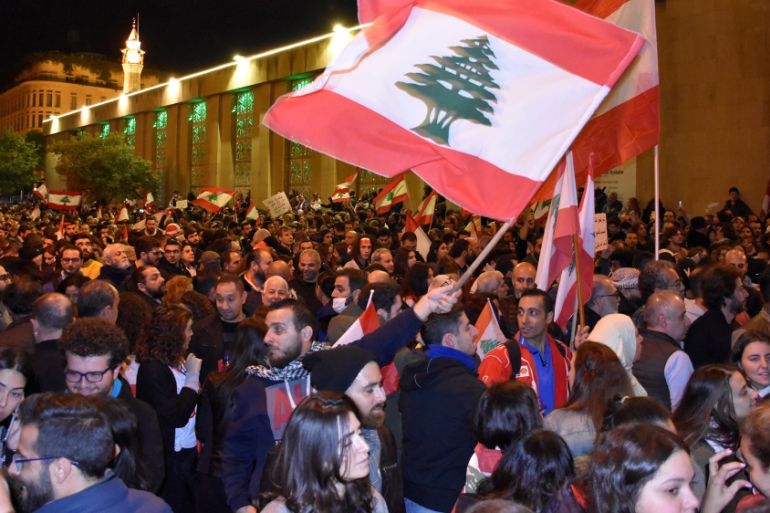Thousands protest against crackdown in Lebanon’s capital
Day after security forces disperse demonstration, protesters march on parliament to call for an independent government.

Thousands of Lebanese people took to the streets in Beirut on Sunday to protest against the potential nomination of Saad Hariri as prime minister and in defiance of the violent crackdown on demonstrators by security forces the previous night.
Riot police had used tear gas and rubber-coated bullets, beat and arrested protesters in an attempt to disperse rallies outside parliament in the capital overnight on Saturday.
Keep reading
list of 3 itemsDozens injured as police clash with protesters in Lebanon
Nations urge Lebanon to form ‘credible’ government to unlock aid
The incident was one of the most violent crackdowns on protesters since nationwide anti-government demonstrations began two months ago, leading to the resignation of Prime Minister Saad Hariri on October 29.
Protesters want a new government of independent experts to be appointed to steer the country through its economic crisis, which they blame on policies adopted by the country’s ruling elite. The demonstrators also want early elections to be held based on a new, non-sectarian electoral law.
The protesters who showed up in Beirut on Sunday chanted against the security crackdown and called for an independent new head of government unaffiliated with established political parties.
The crowd, many raising Lebanese flags, said: “We won’t leave, We won’t leave. Just arrest all the protesters!”
Others raised posters saying the tear gas would not keep them away. “We are crying already,” said one, in a jab at the deep economic crisis Lebanese are facing. The streets leading to parliament were filled with men, women and children. Some huddled in smaller groups while others were lifted on shoulders chanting in megaphones.
Hariri next PM?
The overnight confrontations in Beirut left more than 130 people injured, according to the Red Cross and the Lebanese Civil Defense. The Red Cross said none of the injured was in serious condition and most of them were treated on the spot.
Sunday’s rally came just hours before the president was due to meet with representatives of parliamentary blocs to name a new prime minister. After weeks of bickering and despite calls from the protesters for a technocratic government, politicians seem set on bringing Hariri back to the post.
Al Jazeera’s Zeina Khodr, reporting from Beirut, said that political parties were negotiating among themselves regarding the formation of the next cabinet.
“They’re not hearing the call from the street … [which] is all of you need to leave office,” Khodr said.
“Tomorrow, the parliamentary blocs will be naming their choice of prime minister,” she added. “Saad Hariri, the caretaker prime minister, is expected to be nominated, but the political parties are not in agreement on the formation of his cabinet.”
The demonstrators were clear they would not accept his return. “Saad, Saad, Saad, don’t dream of it any more.”
“I came back today to pressure the parliament to make the right choice tomorrow and choose a prime minister from outside the political parties. If they don’t choose someone acceptable, we will be back to the streets again and again,” Chakib Abillama, a protester and businessman who was demonstrating
on Saturday when violence broke out, told The Associated Press news agency.
Caline Mouawad, a lawyer, said she watched as security forces violently broke up the protests and decided to join in solidarity. “What happened last night provoked me. I came down even it means getting beaten tonight,” she told AP.
Investigation order
Interior Minister Raya Haffar El Hassan on Sunday ordered an investigation into the clashes, which she said injured protesters and security forces.
She said she watched the confrontations “with concern, sadness and shock.”
It was not clear what caused the crackdown.
Al Jazeera’s Khodr said that anti-government protesters remained defiant despite what Amnesty International described as excessive use of force.
“Their message to those in power is that you will not break our will,” Khodr said.
“Thousands converged outside parliament square 24 hours after the centre of Beirut … became a battleground,” she said.
“Dozens of protesters were injured when security forces used tear gas, rubber bullets, and water cannons, to push people away.”
The concern is, Khodr said, is that those in power are now seeking to utilise security forces to intimidate people in the streets in a bid to “crush” the protest movement.
Amnesty International’s Lebanon campaigner, Diala Haidar, decried the actions committed by security forces to disperse an “overwhelmingly peaceful protest”.
1/5 Last night security forces used excessive force to disperse an overwhelmingly peaceful protest in downtown Beirut. The intention was clearly to prevent protesters gathering which is a violation of the right to peaceful assembly. #لبنان_ينتفض
— Diala Haidar (@DialaHaidar) December 15, 2019
“The intention was clearly to prevent protesters gathering which is a violation of the right to peaceful assembly,” Haidar wrote in a post on Twitter.
The protests had largely been peaceful since they began on October 17.